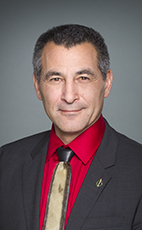Mr. Speaker, I would like to thank the government and the Government House Leader for allowing me some time to speak to this legislation even though they know I am not speaking in support of it. I do appreciate the opportunity.
I think it is important that my voice be heard. I am the only Inuk in the House who can speak freely and vote with my conscience. I cannot in all good conscience support this legislation, because it excludes the Inuit language.
When I voted against Bill C-91 at second reading, I said I would bring forward an amendment, and I did. The minister said in the House that he was open to amendments and was hoping to find one that would work. I spoke with him personally about the intent of my amendment, and he seemed disposed to it.
It was a pretty innocuous amendment. ITK, which has spoken out and come out strongly against this legislation, would not have supported my amendment. Its members felt that the legislation did not go far enough, that it was not strong enough. They worked with my colleagues in the NDP to bring forward other amendments at committee.
In my discussions with the minister, he indicated to me that part of the problem with the amendments and what ITK was looking for with the legislation was that it did not fit the mandate and the scope of the legislation. I was very careful to draft my amendment to make sure that it fit within the scope and the mandate of the legislation.
Having sat on the other side, I understand that we are limited as to what we can and cannot do by the mandate that we have. I was very cognizant of that in bringing forward that amendment. My amendment simply left the door open for the minister to have the ability to work with Inuit for the inclusion of our language.
We have often heard the Prime Minister and ministers in the House claim that when it comes to committees, members are independent. We hear that they are not told how to vote at committee. I now know that is not the case. At this committee, we have the same old same old. All the Liberal members voted my amendment down, as they were told. In fact, they voted down every single opposition amendment.
I may be a little naive, but I am of the belief that committees of the House are supposed to be where all members, regardless of party affiliation, can work together to make improvements to legislation. Believe me, this legislation needs improving.
To vote down amendments without regard or consideration, simply because one is a Liberal and others are not, is childish politics. It has no place in our democracy.
In Nunavut, we govern by consensus. We have no political divisions. All members work together for the good of the people. We could use more of that in this place. Bill C-91 would be a better piece of legislation for it.
Last week, I asked the Prime Minister why, in the budget, he was funding ITK directly and bypassing the Government of Nunavut to deal with our housing and health care crises, even though the Government of Nunavut is the service provider. He got pretty hot under the collar. He was very agitated when he said, “I will make no apologies for a distinctions-based approach...”.
That is exactly the approach that ITK thought was being used when developing this legislation. However, it has become very clear that the government never had any intention of using it, and this is one of the major problems that ITK has with it.
In those comments, the Prime Minister seemed to be saying that for the budget he was taking a nation-to-nation approach with Inuit. Well, he cannot have it both ways, nation building with Inuit in one bill and excluding us on another.
This is very important legislation and long overdue. The preservation of languages is important to all cultures. Now, for the first time, we are recognizing indigenous languages, ensuring they are protected from extinction, just not all of them.
For that reason, because Inuit languages are not included in the legislation, I cannot support it. I look forward to any comments or questions from members.

